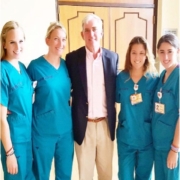Susan D. Flynn Oncology Nursing Fellowship 2015
Kristen Ponticelli (Flynn Fellow 2015)
Kristen Ponticelli was a Molloy Nursing Student who graduated in May of 2016. She completed the 2015 Susan D. Flynn Oncology Nursing Fellowship.  Along with being a Registered Nurse, Kristen writes for nurse.com where she talks about her experiences in nursing school and as a new grad. She offers great advice for your journey through nursing school. In her article below she wrote about the Susan D. Flynn Oncology Nursing Fellowship and how that Fellowship has played an impact On her decision to become an Oncology Nurse. For more information visit Kristen’s blog. Congratulations Kristen for your wonderful achievements!
Along with being a Registered Nurse, Kristen writes for nurse.com where she talks about her experiences in nursing school and as a new grad. She offers great advice for your journey through nursing school. In her article below she wrote about the Susan D. Flynn Oncology Nursing Fellowship and how that Fellowship has played an impact On her decision to become an Oncology Nurse. For more information visit Kristen’s blog. Congratulations Kristen for your wonderful achievements!
Summer Plans Should Include an Invaluable Internship
We have come to mid‐semester, and I am sure most of us, myself included, are thinking ahead to a much-needed summer vacation after another intense semester of nursing school. But what we really should be doing is searching for summer internships. I could not stress enough how important it is to get your foot in the door.
From my experience — and from what I have heard from my peers — internships give you something that we just don’t get in nursing school. For the most part, the faculty likes having you there, and it can give you one‐on‐ one experience not only with the nurses, but with the patients that we, as nursing students, can never get enough of.
I was honored to be accepted into the Susan D. Flynn Oncology Fellowship Program last summer where I was able to work for eight weeks on an oncology unit at NewYork‐Presbyterian Hospital. It was a wonderful experience that taught me a lot. Here are five reasons you should aim for a summer internship:
1. You’re able to work side by side with nurses
Most of the staff at an internship site is very receptive to summer interns, and you can be open for basically any learning experience they can offer. If you are able to find a nurse who loves to teach, you will learn more than you could have ever imagined. They may allow you to watch procedures you may never have seen, such as the insertion of a central line. Also, just getting to work side by side with nurses for the extent of their shift is a lesson in itself. You will see how they organize their day and how they deal with problems as they arise. Yes, you may be helping to maintain the personal hygiene of patients, but you can learn so much from this. You learn to talk to patients and comfort them in a time of need, and nothing beats that connection.
2. You’ll learn how to be a team player
During your internship, there will be tasks you are allowed to do and others you cannot do. But you can always lend a hand. You can be there to help a busy CNA with bathing a patient or assist a nurse who needs help turning a patient. The staff on a unit is a team. They help each other when they have an extra minute. If you can learn this now, the staff will notice and may want to invite you back.
3. It helps you decide on a specialty
I always wanted to be an oncology nurse, but at my school we don’t do our clinical rotations on oncology units. Although I thought this is what I want to specialize in when I become an RN, I was never 100% positive. But now I know for sure I want to become an oncology nurse, and I owe that decision to my internship. It is important to go after what you want. Search the Internet and ask around your school for internships offered in a specialty unit in which you are interested.
4. It allows you networking opportunities
Getting an internship gets your feet in the door. You can create professional relationships with the staff and show them what kind of nurse you will be. And by keeping in touch with the nurse manager and others, you allow yourself to build your professional network.
5. You may find your first nursing job
You may not think so because you are “just an intern,” but staff and nursing administrators will notice if you are friendly, hard‐working, team player. They may even ask you to come back as either a CNA or even an RN once you pass the NCLEX.



